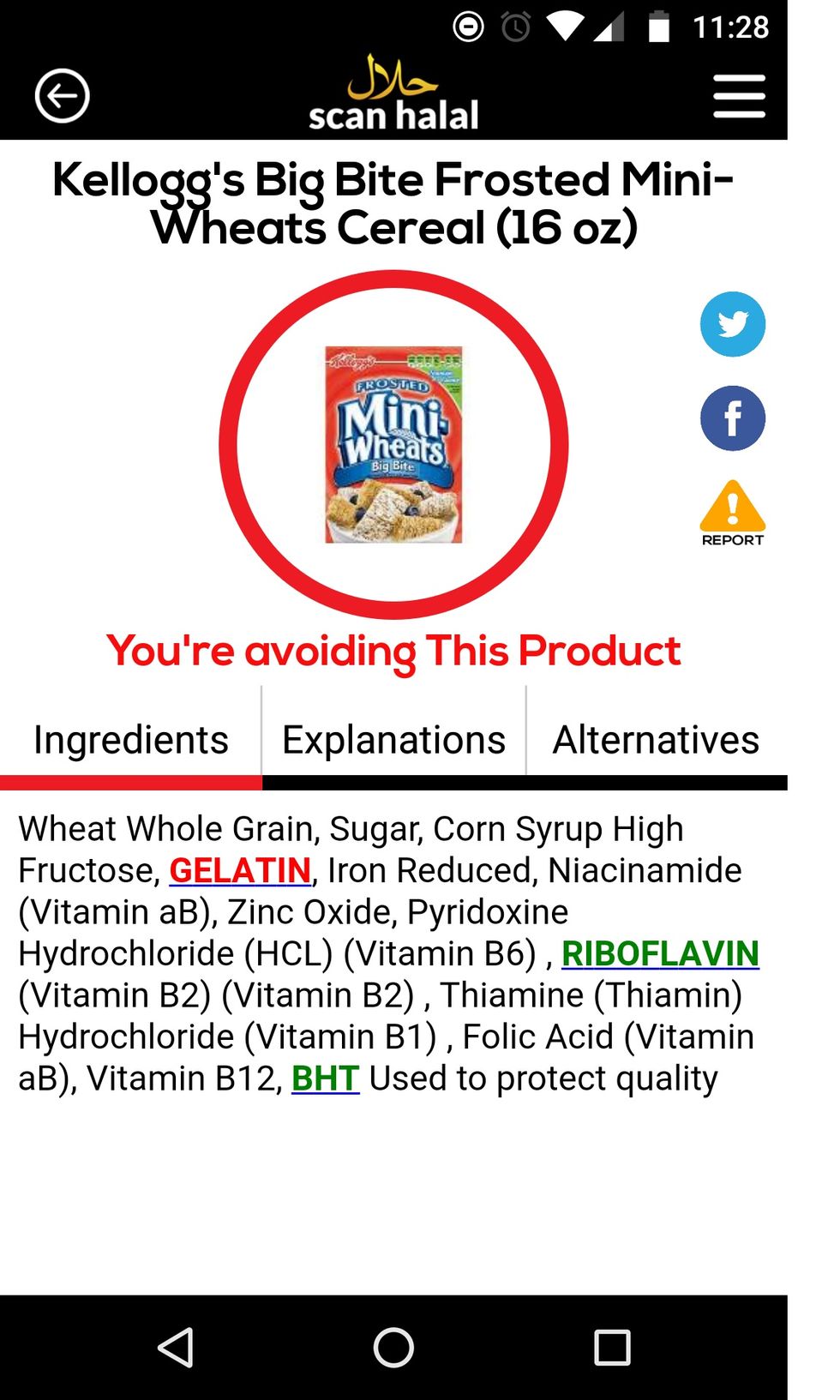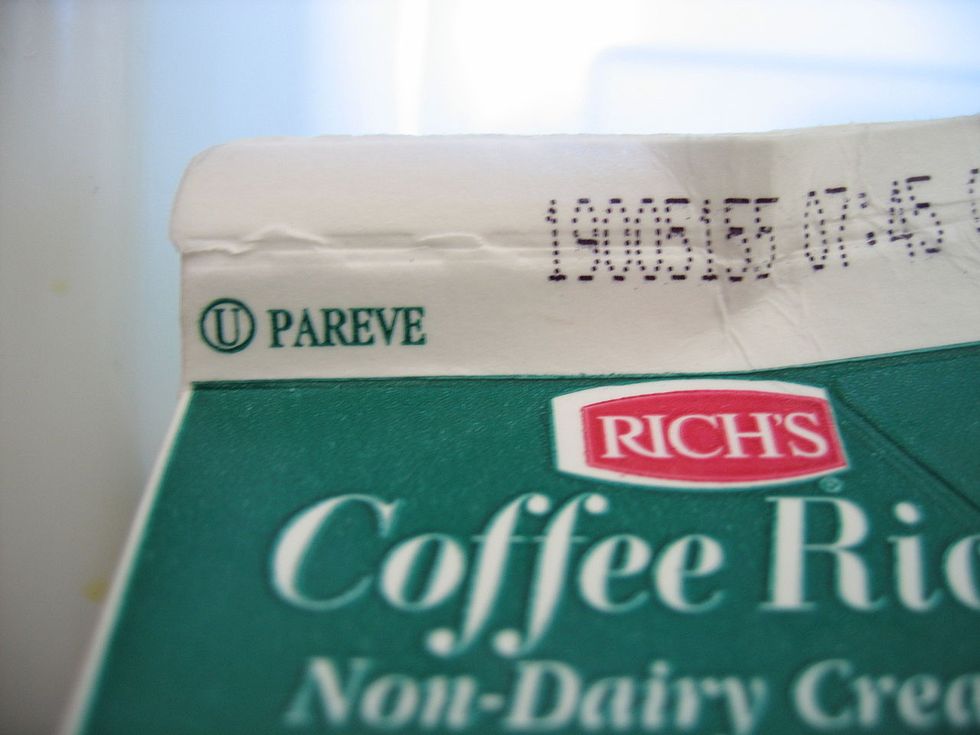To Muslims, eating halal is a religious dietary requirement, much like Kosher is to Jews — except stricter and rarely catered to in the Western world. Whereas Jews can be assured a product is Kosher by the symbol on the package and toss into the cart, a Muslim's trip to the grocery store means donning your undercover CIA foodie hijab and printing yourself a nutritionist certification. Back in the day, to make sure all the food we're purchasing is halal, each product underwent a preliminary, scrutinizing scan, a thorough background check supported by online research and was followed by a phone call to the parent company to correlate our findings with their database listings of the ingredients' sources. Now, since 2008 and the introduction of apps, eating halal has become so much easier. Although it's still the same extensive process, verifying the haram/halal status of your food has become simple enough that it can be boiled down to four easy steps!
1. Download the Scan Halal app or any other that fits your needs best.
There's a whole slew of halal scan apps available, including the E-Numbers scanner for Muslims living in the European Union as well as the Halal Food app by the creator and owner of Muslim Consumer, Rasheed Ahmed, but from the ones I have tried, Scan Halal has proven to be the most effective due its comprehensive database. It lists various products, especially those most commonly purchased, and it even lists where in the U.S. each product is being scanned!
When you first open the app, it will ask you for to select your "halal settings," which translates to, how strict do you want to be? Always choose "zabiha" — all ingredients derived from animal (unless halal certified) and alcohol will be considered not permissible — because one, that's what "halal" requires anyways, and two, because if you mistakenly do eat haram, you will lose 40 days of ibaadat (rewards for your good deeds, even your daily five prayers)! That's why it's better to be safe than sorry in this case.
You can customize your settings further as well. The Scan Halal app lists every ingredient in the product and explains exactly why that said ingredient is halal or haram. This helps me narrow down exactly what I need to ask the ingredient specialists when I call the product's company to verify the information present.
Why would I do that if the app already confirms the product's status?
Because unfortunately, like every other halal/haram app out there, most of the times that status is "unknown," so that requires a bit more digging than usual. The halal apps are all still undergoing development today, but it's a great leap in progress so far, considering how difficult it was to break down a whole ingredients list yourself less than 10 years ago!
2. If your app pulls up "unknown" for the food's status, look for dietary symbols.
On the front of every package, there will be a dietary symbol. Can you find it on the carton above?
The most common symbols are "U," "UD" and "K." All three symbols stand for Kosher, with the first two referring to the dairy present in the product. These symbols also mean that all the fat-based ingredients in the product (except diary) are from a vegetable source (as long as the ingredients list also does not contain any of the following: wine, alcohol, gelatin and L-Cysteine).
Meat, on the other hand, is held to a more rigid halal standard based on the way it's slaughtered. In Islam, if the animal in question is not halal to begin with (i.e. pig, which is not permissible for Muslims to consume in any way, shape or form), then that meat is automatically haram. Halal meat only comes from land animals with free flowing blood, like deer, rabbits, cows and chickens, to name a few. However, the animal cannot simply be slaughtered and count as halal meat; it must be sacrificed in the name of God (Allah) using a certain procedure known as qurbani.
The qurbani method not only lessens the animal's suffering and serves as a quick, efficient process, but it also promotes cage-free, natural growth of animals and caps the Muslim population's consumption of meat to healthy boundaries. This is why Muslims avoid the carcass meat of any and every animal butchered at your local factory.
So, if the symbol on the product is either of the three letter combinations above, then it passes the preliminary checks! The next thing to consider is the ingredients list.
3. Are any of the ingredients listed 100 percent haram?
It's most certainly possible, even with dietary symbols like Kosher, because unlike Muslims, Jews drink alcohol and wine.
Check for any of the haram ingredients listed below:
- Gelatin (including Kosher version)
- L-Cysteine — found in high-protein foods
- Liquor, beer batter, rum flavor or wine (including wine vinegar)
- Any grape wine by product (like powder, oil or seed extract)
- Ethyl alcohol or ethanol
- Cochineal or carmine — often found in food coloring
- Naturally brewed soy sauce — uses alcohol during process
- Brewer yeast extract
- Vanilla extract (any natural vanilla) — uses alcohol during process
- Confectionary glaze or resinous glaze
4. And if there are any ingredients listed that you don't recognize...
Call the company branded on the product, and ask: "Are there any animal derivatives in this product? Is there any alcohol in this product or was any alcohol used in the ingredients to create this product?"
Some common ingredients you will need to call to ask about are:
- Torula yeast (if grown on alcohol) — found in processed foods
- Carrageenan (if made with ethyl alcohol) — found in dairy products
- Natural flavoring*
- Artificial flavoring*
You may have difficulty determining the halal/haram status of the last two flavoring ingredients, because companies will claim that information is "proprietary." In simpler terms, because those ingredients are under 1 percent, they fall under the umbrella category of "natural" or "artificial" flavor, and they help to maintain the originality of the manufacturer's product so it cannot be replicated.
In this case, it's best to clarify that you are not asking for specific ingredients, you are simply concerned if there is any alcohol used or present in the natural or artificial flavoring. More often that not, the company specialist will then put you on hold and consult a manager first before answering your question truthfully, but some are quite secretive and may require a few emails to assure them you are not attempting to steal trade secrets.
Even if it's tough to narrow down ingredients, particularly in the Western world, eating halal is not a challenge if you use the resources available to you, stay updated with nutrition facts and listings on Muslim Consumer and always call and ask to confirm!
If you do your best, Allah (swt) will make it easy for you.
...Verily, Allah does not destroy the rewards of those who do good. (Qurān 11:115)























